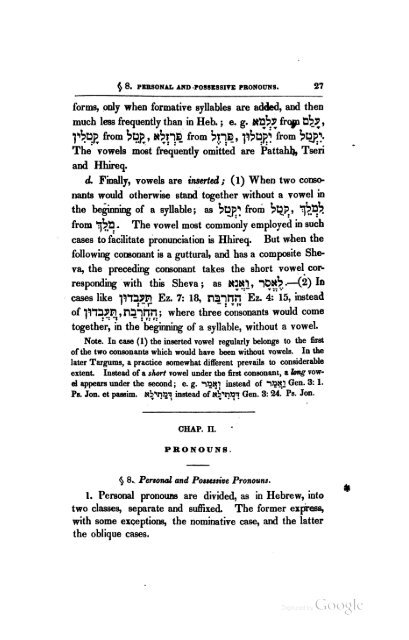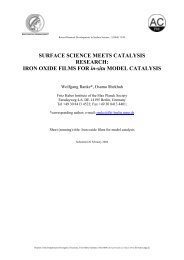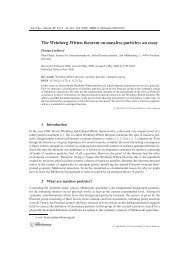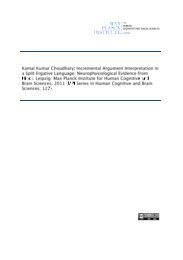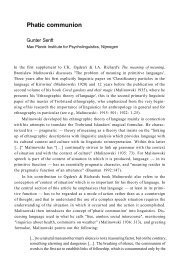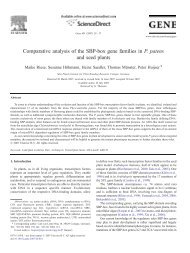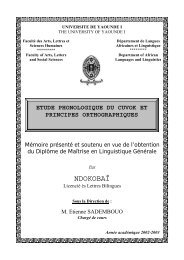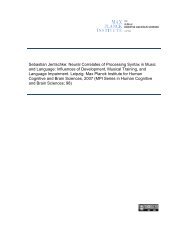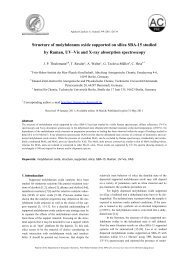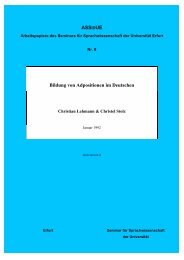A manual of the Chaldee language - PubMan
A manual of the Chaldee language - PubMan
A manual of the Chaldee language - PubMan
You also want an ePaper? Increase the reach of your titles
YUMPU automatically turns print PDFs into web optimized ePapers that Google loves.
forms, only when formative syllables are added, and <strong>the</strong>n<br />
much less frequently than in Heb. ; e. g. ~ ~ fralp 5 a%?, 3<br />
I'~u? : 7 from $up, .*r Y r:. ~ ? Q from 5?.10, . :- 17$Q$ i m Sy9*<br />
The vowels most frequently omitted are 'Pattab TS&<br />
-<br />
and Hhireq.<br />
d Finally, vowels are inserted; (1) When two c om<br />
nants would o<strong>the</strong>rwise stand toge<strong>the</strong>r without a vowel in<br />
<strong>the</strong> be$nibg <strong>of</strong> a syllable; as 55: from 5~?, ~??2$<br />
from 75a. .. . The vowel most commo~ly employed in such<br />
cases to facilitate pronunciation is Hhireq. But when <strong>the</strong><br />
following cornonant is a guttural, and has a composite Sheva,<br />
<strong>the</strong> preceding consonant takes <strong>the</strong> short vowel corresponding<br />
with this Sheva ; as YJYI .r -:- , lbY$ .-(2) In<br />
cases like j?.l?q Ez. R 18, n>-)nn Ez. i:::ia, instead<br />
-: TIT<br />
<strong>of</strong> j7733n. .-: -l na$jnn ; where three consonants would come<br />
: r: r:<br />
toge<strong>the</strong>r, in <strong>the</strong> beginning <strong>of</strong> a syllable, without a vowel.<br />
Note. In case (1) <strong>the</strong> inserted vowel regularly belongs to <strong>the</strong> first<br />
<strong>of</strong> <strong>the</strong> two consonants which would have been without vowels. In <strong>the</strong><br />
later Targums, a practice somewhat different prevails to considerable<br />
extent. Instead <strong>of</strong> a short vowel under <strong>the</strong> first consonant, a &ng vow-<br />
el appears under <strong>the</strong> second; e. g. %!? instead <strong>of</strong> 'In82 Gen. 3: 1.<br />
Ps. Jon. et pasaim. N*;? instead <strong>of</strong> N*:? Gen. 3: 24. Ps. Jon.<br />
CHAP. 11. -<br />
PRONOUNS.<br />
Q 8, Personal and Possessive Pronouns.<br />
1. Personal pronouns are divided, as in Hebrew, into<br />
two classes, separate and suffixed. The former express,<br />
with some ex~eptions, <strong>the</strong> nominative case, and <strong>the</strong> latter<br />
<strong>the</strong> oblique cases.<br />
. .<br />
4t


